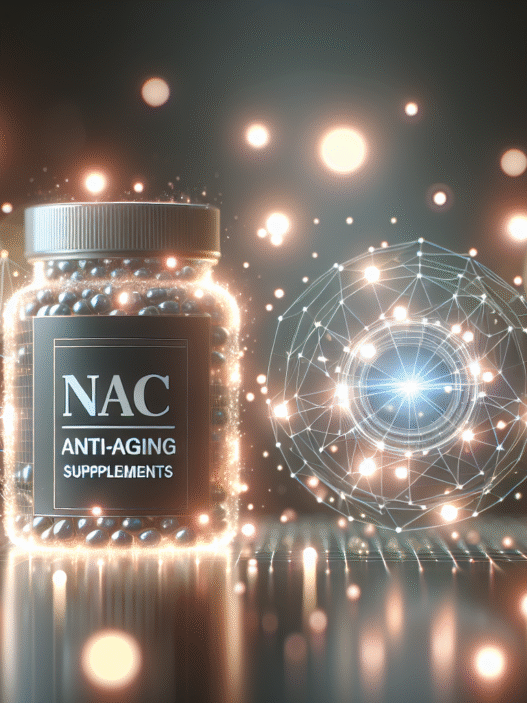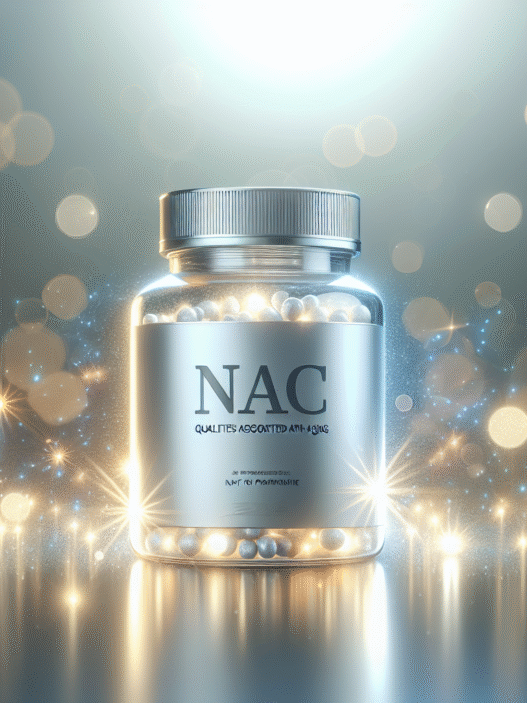Understanding NAC Supplementation
Introduction to NAC
N-acetylcysteine (NAC) is a supplement recognized for its significant role in producing antioxidants, particularly glutathione. Glutathione is one of the body’s most crucial antioxidants, crucial for combating oxidative stress and enhancing cellular health. Through its antioxidant properties, NAC is believed to improve various health conditions and potentially reduce the risk of chronic diseases such as cardiovascular illness (Healthline).
The appeal of NAC lies in its ability to support not just liver health and detoxification, but also overall longevity. This makes it a popular choice for individuals seeking ways to enhance their longevity and maintain well-being throughout their lives.
Mechanism of Action
NAC’s effectiveness as an antioxidant is primarily due to its ability to boost intracellular levels of glutathione. Glutathione plays a vital role in maintaining cellular redox status. Furthermore, NAC exhibits anti-inflammatory properties by lowering levels of tumor necrosis factor-alpha (TNF-α) and interleukins (IL-6 and IL-1β). It does this through the inhibition of nuclear factor kappa B (NF-κB), which is a key player in inflammatory responses. Despite its potential therapeutic uses, the effectiveness of NAC in various clinical applications remains mixed (PubMed Central).
In specific health conditions such as chronic obstructive pulmonary disease (COPD), research findings have been inconsistent. Lower doses of NAC have not shown significant benefits in improving lung function or reducing exacerbations. Conversely, studies using higher doses have demonstrated a reduction in the frequency of exacerbations and some improvement in lung function, indicating that dosage is a critical factor in NAC’s efficacy. Meta-analyses suggest that extended treatment with high doses can lower the risk of exacerbations in COPD, although it may not significantly affect overall lung function parameters.
For those interested in the health benefits and applications of NAC, exploring its various effects can provide valuable insights into how to support overall health effectively. Further information regarding the advantages of NAC can be found in our detailed section on n-acetyl cysteine benefits and its specific applications in anti-aging through nac for anti-aging.
Health Benefits of NAC
N-Acetyl Cysteine (NAC) is recognized for its numerous health benefits, particularly due to its antioxidant properties. Below are some key areas where NAC demonstrates significant effects.
Oxidative Stress Management
NAC is valued primarily for its role in antioxidant production, helping to create and replenish glutathione, one of the body’s most essential antioxidants. Increased levels of glutathione in the body can improve various health conditions and reduce the risk of chronic illnesses such as cardiovascular disease.
| Health Condition | Oxidative Stress Reduction |
|---|---|
| Cardiovascular Disease | ✔️ |
| Diabetes | ✔️ |
| Kidney Disease | ✔️ |
Detoxification Support
NAC plays a significant role in detoxification, particularly in preventing or alleviating damage to the liver and kidneys. It is frequently used in medical settings for acetaminophen overdose and is beneficial in managing other liver diseases. By enhancing detoxification pathways, NAC supports liver health, making it a valuable supplement for those concerned about their overall well-being.
| Organs Supported | Detoxification Support |
|---|---|
| Liver | ✔️ |
| Kidneys | ✔️ |
Mental Health and Neurological Benefits
NAC may also alleviate symptoms associated with various mental health conditions, including bipolar disorder, schizophrenia, and obsessive-compulsive disorder (OCD). Research indicates that NAC can reduce symptoms of depression and improve overall mental health resilience.
| Condition | Potential Benefit |
|---|---|
| Bipolar Disorder | ✔️ |
| OCD | ✔️ |
| Depression | ✔️ |
Respiratory System Support
As an antioxidant and expectorant, NAC is effective in alleviating symptoms of different respiratory conditions such as chronic obstructive pulmonary disease (COPD), chronic bronchitis, and asthma. It enhances lung function and reduces inflammation, making it a beneficial supplement for individuals with respiratory issues.
| Respiratory Condition | NAC Benefit |
|---|---|
| COPD | ✔️ |
| Chronic Bronchitis | ✔️ |
| Asthma | ✔️ |
The numerous nac anti-aging effects underline its significance in supporting health and longevity. Individuals seeking to maintain liver health and overall well-being may find NAC supplementation to be a valuable addition to their health regimen. For detailed information about dosage and safety, refer to our article on n-acetyl cysteine dosage.
NAC and Disease Prevention
N-acetylcysteine (NAC) is recognized for its multifaceted roles in enhancing overall health. Its potential in disease prevention, particularly in cardiovascular health, metabolic health, and organ function, makes it a valuable supplement for individuals concerned about longevity and wellness.
Cardiovascular Health
NAC’s antioxidant and anti-inflammatory properties contribute to lower risks of heart disease. By reducing oxidative stress, it helps maintain healthy blood vessels and improves heart function. Research indicates that NAC can help mitigate the adverse effects of inflammation on the cardiovascular system, which can lead to improved blood circulation and a healthier heart overall (WebMD).
| Benefit | Description |
|---|---|
| Reduces Oxidative Stress | Lowers the risk of heart disease by protecting blood cells. |
| Improves Blood Circulation | Enhances blood flow and reduces arterial stiffness. |
| Anti-Inflammatory Effects | Diminishes the risks associated with vascular inflammation. |
Metabolic Health
NAC has shown promise in managing obesity-related issues. It helps improve fat tissue function and balances hormones, mitigating insulin resistance and inflammation. This can be particularly beneficial for individuals struggling with conditions like type 2 diabetes. By aiding in the regulation of key metabolic processes, NAC may contribute to healthier blood sugar levels and overall metabolic function (WebMD).
| Benefit | Description |
|---|---|
| Balances Hormones | Helps stabilize hormone levels related to metabolism. |
| Reduces Insulin Resistance | Improves the body’s response to insulin, lowering diabetes risk. |
| Aids Weight Management | Supports energy metabolism and fat storage efficiency. |
Kidney and Liver Function
NAC is critical for enhancing liver and kidney function. It supports the breakdown of drugs and toxins, thereby improving the efficiency of these organs, especially in cases of liver or kidney diseases. Its potent detoxifying properties make it a go-to supplement for people concerned about minimizing effects from environmental toxins, medications, and other harmful substances.
| Benefit | Description |
|---|---|
| Supports Liver Detoxification | Boosts glutathione levels, crucial for detoxification processes. |
| Enhances Kidney Health | Promotes better function and recovery from damage. |
| Prevents Damage from Substances | Effective in treating acetaminophen overdose by protecting the liver. |
NAC’s potential as a preventive measure against various diseases highlights its necessity for individuals mindful of their health. Continued research may uncover even more benefits of this powerful supplement, affirming its role in the anti-aging conversation. For more information, visit our articles on n-acetyl cysteine benefits and nac supplement benefits.
NAC for Specific Health Conditions
Polycystic Ovary Syndrome (PCOS)
N-acetylcysteine (NAC) has shown promise in improving insulin sensitivity in individuals with Polycystic Ovary Syndrome (PCOS). Research indicates that NAC supplementation can help regulate hormonal imbalances associated with this condition. It may also aid in restoring ovarian function and promoting ovulation in women with PCOS (Medical News Today).
The following table summarizes the potential benefits of NAC for PCOS management:
| Health Aspect | NAC Benefits |
|---|---|
| Insulin Sensitivity | Improves insulin resistance |
| Hormonal Balance | Helps regulate hormones |
| Ovulation | Promotes ovarian function |
Acetaminophen Overdose
NAC is widely recognized for its critical role in treating acetaminophen overdose, a potentially life-threatening condition. In cases of overdose, NAC acts as an antidote by replenishing glutathione levels in the liver, thus preventing liver damage. Timely administration of NAC can significantly improve recovery and reduce the risk of complications.
The effectiveness of NAC in acetaminophen overdose is as follows:
| Condition | Timing for NAC Administration | Outcome |
|---|---|---|
| Acetaminophen Overdose | Within 8-10 hours | Reduces liver damage and improves recovery |
Chronic Obstructive Pulmonary Disease (COPD)
NAC’s antioxidant properties make it beneficial for individuals with Chronic Obstructive Pulmonary Disease (COPD). As an expectorant, NAC helps alleviate symptoms by thinning mucus and improving lung function, thereby decreasing inflammation in the respiratory system. It may also enhance overall lung health, providing users with better respiratory support.
The table below highlights NAC’s benefits for managing COPD:
| COPD Management Aspect | NAC Benefits |
|---|---|
| Mucus Clearance | Thins mucus for easier expulsion |
| Inflammation Reduction | Reduces inflammation in the lungs |
| Lung Function | Improves overall lung health |
NAC’s versatility extends to various health conditions, making it a valuable supplement for those concerned about liver health, detoxification, and overall vitality. For further details on its broader health benefits, refer to our article on N-acetyl cysteine benefits.
Research Studies on NAC
Investigating the efficacy of N-Acetyl Cysteine (NAC) has become increasingly important as its potential health benefits gain attention. This section reviews key research findings on the treatment of various diseases and highlights significant clinical trial results.
Efficacy in Disease Treatment
NAC has been found to have multiple applications in treating various health conditions. Research demonstrates the following benefits:
-
Psychiatric Conditions: NAC shows promise in treating conditions like depression and bipolar disorder by influencing glutamate levels in the brain, which may contribute to cognitive function (Medical News Today).
-
Lung Conditions: Studies indicate NAC may aid those with chronic obstructive pulmonary disease (COPD) and other respiratory issues by reducing inflammation in the airways, thus improving lung function (WebMD).
-
PCOS: For women with polycystic ovary syndrome, NAC has been noted to enhance insulin sensitivity, which can be beneficial for menstrual regulation and metabolic health.
-
Acetaminophen Overdose: NAC is a well-known antidote for acetaminophen overdose due to its ability to replenish glutathione levels, which helps protect the liver.
-
COVID-19: Recent investigations have explored the potential of NAC in managing COVID-19. It may help suppress virus replication and has shown promise in reducing the need for mechanical ventilation.
Clinical Trial Results
A number of clinical trials have reinforced the beneficial effects of NAC:
| Study Focus | Findings |
|---|---|
| Psychiatric Disorders | Clinical trials suggest that NAC can significantly improve symptoms of depression and bipolar disorder. |
| Respiratory Disorders | Trials show that NAC reduces exacerbations in patients with COPD and assists in mucus clearance. |
| PCOS Management | Trials indicate improvements in menstrual regularity and insulin sensitivity in women with PCOS. |
| COVID-19 Management | Some studies report reduced lung inflammation and lower hospitalization rates in patients treated with NAC for COVID-19. |
These findings support the growing interest in NAC for various applications, particularly for those concerned about liver health, detoxification, and overall longevity. Further investigations on n-acetyl cysteine benefits continue to explore its extensive therapeutic potential. For specific dosage recommendations, consult our guide on n-acetyl cysteine dosage.
Safety and Dosage of NAC
Understanding the safety and proper dosage of N-Acetyl Cysteine (NAC) is vital for individuals seeking its benefits for anti-aging and overall health. This section will address the bioavailability, potential side effects, and recommended dosages of NAC.
Bioavailability and Pharmacokinetics
The bioavailability of free NAC is notably low, with less than 10% reaching the plasma and tissues. This means that only a small amount of the intact NAC molecule has an active effect in the body. The pharmacokinetics of NAC is complex and not yet fully understood. When metabolized, NAC is converted primarily into cysteine, cystine, inorganic sulfate, and glutathione (PubMed Central).
| Administration Route | Cmax (mg/L) | Terminal Half-Life (h) |
|---|---|---|
| Intravenous | 554 | 5.58 |
| Oral | Low bioavailability; varies based on individual absorption |
NAC clearance may be altered in patients with severe liver injury or end-stage renal disease (ESRD). ESRD patients show a 90% reduction in NAC clearance compared to healthy individuals, leading to greater systemic exposure (PubMed Central).
Side Effects and Adverse Reactions
While NAC is generally considered safe for most individuals, it can cause side effects in some cases. Common side effects may include:
- Gastrointestinal distress (nausea, vomiting, diarrhea)
- Allergic reactions (rash, itching, swelling)
- Headache
In rare cases, some people may experience more severe reactions, such as difficulty breathing or chest pain. It is recommended that individuals with asthma or a history of allergic reactions consult a healthcare provider before using NAC.
Recommended Dosage
The recommended dosage of NAC can vary depending on the intended use and individual circumstances. Common dosages include:
| Purpose | Recommended Dosage |
|---|---|
| General health and antioxidants | 600 mg to 1,200 mg per day |
| Acetaminophen overdose treatment | 140 mg/kg (initial dose) followed by 70 mg/kg every 4 hours for 17 doses |
| COPD management | High doses may vary; consult a healthcare professional for specific dosage recommendations |
Individuals considering NAC supplementation should consult with a healthcare provider to determine the appropriate dosage tailored to their needs, especially those who are pregnant, breastfeeding, or have existing health conditions. For more on specific benefits, refer to n-acetyl cysteine benefits or n-acetyl cysteine dosage.





















